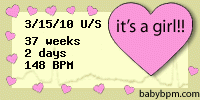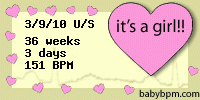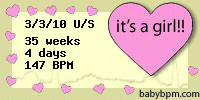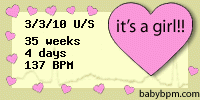Your pregnancy: 36 weeks
How your baby's growing:
Your baby is still packing on the pounds — at the rate of about an ounce a day. She now weighs almost 6 pounds (like a crenshaw melon) and is more than 18 1/2 inches long.
She's shedding most of the downy covering of hair that covered her body as well as the vernix caseosa, the waxy substance that covered and protected her skin during her nine-month amniotic bath. Your baby swallows both of these substances, along with other secretions, resulting in a blackish mixture, called meconium, will form the contents of her first bowel movement.
At the end of this week, your baby will be considered full-term. (Full-term is 37 to 42 weeks; babies born before 37 weeks are pre-term and those born after 42 are post-term.)
Most likely she's in a head-down position. But if she isn't, your practitioner may suggest scheduling an "external cephalic version," which is a fancy way of saying she'll try to coax your baby into a head-down position by manipulating her from the outside of your belly.
Note: Every baby develops a little differently — even in the womb. Our information is designed to give you a general idea of your baby's development.
How your life's changing:
Now that your baby is taking up so much room, you may have trouble eating a normal-size meal. Smaller, more frequent meals are often easier to handle at this point. On the other hand, you may have less heartburn and have an easier time breathing when your baby starts to "drop" down into your pelvis.
This process — called lightening — often happens a few weeks before labor if this is your first baby. (If you've given birth before, it probably won't happen before labor starts.) If your baby drops, you may also feel increased pressure in your lower abdomen, which may make walking increasingly uncomfortable, and you'll probably find that you have to pee even more frequently.
If your baby is very low, you may feel lots of vaginal pressure and discomfort as well. Some women say it feels as though they're carrying a bowling ball between their legs!
You might also notice that your Braxton Hicks contractions are more frequent now. Be sure to review the signs of labor with your practitioner and find out when she wants to hear from you.
As a general rule, if you're full-term, your pregnancy is uncomplicated, and your water hasn't broken, she'll probably have you wait to come in until you've been having contractions that last for about a minute each, coming every five minutes for an hour. Of course, you'll want to call right away if you notice a decrease in your baby's activity or think you're leaking amniotic fluid, or if you have any vaginal bleeding, fever, a severe or persistent headache, constant abdominal pain, or vision changes.
Even if you're enjoying an uncomplicated pregnancy, it's best to avoid flying (or any travel far from home) during your final month because you can go into labor at any time. In fact, some airlines won't let women on board who are due to deliver within 30 days of the flight.
Eating in "Start collecting take-out and delivery menus from local restaurants. You won't have time to cook in the early weeks after giving birth. Even restaurants without a visible take-out business will usually accommodate a to-go order (especially if it's for a new mom!)." — Kristina
Surprising Facts: The stages of labor
For first-time moms, labor takes an average of 15 hours, though it's not uncommon to last more than 20. (For women who've previously had a vaginal birth, it takes eight hours, on average.) The process of labor and birth is divided into three main stages. Here are the highlights on how childbirth progresses:
The first stage begins when you start having contractions that progressively dilate and efface your cervix and it ends when your cervix is fully dilated. This stage is divided into two phases, early and active labor.
It can be tricky to determine exactly when early labor starts. That's because early labor contractions are sometimes hard to distinguish from the inefficient Braxton Hicks contractions that you may have been feeling for some time.
Unless there are complications or your midwife or doctor has advised you otherwise, expect to sit out most of your early labor at home. (Be sure, though, to check in with your caregiver to make certain.)
Early labor ends when your cervix is about 4 centimeters dilated and your progress starts to speed up. At this point, you enter what's known as the active phase of labor. Your contractions become more frequent, longer, and stronger.
The last part of the active phase — when your cervix dilates from 8 to 10 centimeters — is called the transition period because it marks the transition to the second stage of labor. This is the most intense part of the first stage, with contractions that are usually very strong, coming about every two and a half to three minutes and lasting a minute or more.
Once your cervix is fully dilated, the second stage of labor begins: the final descent and birth of your baby. This is the "pushing" stage of labor, and it can last anywhere from minutes to a few hours. (It's likely to be quicker if you've previously given birth vaginally.)
Your baby's head will continue to advance with each push until it "crowns" — the term used to describe the time when the widest part of your baby's head is finally visible. After your baby's head comes out, your midwife or doctor will suction his mouth and nose, and feel around his neck for the umbilical cord. His head then turns to the side as his shoulders rotate inside the pelvis to get into position for their exit. With the next contraction, you'll be coached to push as his shoulders deliver, one at a time, followed by the rest of his body.
You may feel a wide range of emotions now: euphoria, awe, pride, disbelief, excitement (to name a few), and, of course, intense relief that it's all over. Exhausted as you may be, you'll also probably feel a burst of energy, and any thoughts of sleep will vanish for the time being.
The final stage of labor begins immediately after the birth of your baby and ends with the delivery of your placenta. The contractions in the third stage are relatively mild.
This Week's Activity:
Create a grapevine. Make a list of all the people you want to hear about your baby's birth — with their phone numbers or e-mail addresses — and pass this along to a friend who can spread the news. That way, when you're ready for others to know, all you have to do is make one call. Include at least one person from work on the list, so they can spread the word there.
What to pack for the hospital when you're having a c-sectionYou're likely to be in the hospital for four or five days after a c-section. Use our list to make sure you have everything you need for your stay – and be sure to check out the suggestions from BabyCenter moms who've been through it.
We recommend packing your bag when you're eight months pregnant. Remember: Your body doesn't know you have a c-section scheduled. You could go into labor at any time in the weeks before your scheduled date.
For you
• A picture ID (driver's license or other ID), your insurance card, and any hospital paperwork you need
• A list of people to call and their phone numbers, your cell phone and charger, or, if you'll be using the hospital phone, a prepaid phone card
After your baby's born, you'll want to call family and friends to let them know the good news. Make a list of people you'll want to contact ahead of time so you don't forget someone important when you're exhausted after delivery.
• Toiletries
Pack a few personal items, such as a toothbrush and toothpaste, lip balm, deodorant, a brush and comb, makeup, and a hair band or barrettes. Hospitals usually provide soap, shampoo, and lotion, but you might prefer your own.
• Eyeglasses
Even if you usually wear contacts, you may not want to deal with them while you're in the hospital.
• A bathrobe, a nightgown or two, slippers, and a few pairs of socks
Hospitals provide gowns and socks for you to use during your stay, but most will allow you to wear your own clothes if you prefer. Choose something loose and comfortable that you don't mind getting dirty. Your own slippers and robe come in handy once you're up and walking around.
• Comfortable nursing bras or regular bras
Whether or not you choose to breastfeed, your breasts are likely to be tender and swollen when your milk comes in. This can happen anytime during the first several days after delivery. Once it does, breast pads can help absorb leaks.
• Several pairs of maternity underpants
Some women love the mesh underwear usually provided by the hospital; others don't. You can't go wrong with your own roomy cotton underpants. Make sure the waistband is loose enough that it won't press on your abdomen at all. The hospital will provide sanitary pads, which you'll need because even after a c-section, you'll bleed after delivery. Make sure you have a supply of heavy-duty pads waiting at home!
• Snacks!
Once the nurses give you the okay to start eating, you may be pretty hungry, and you won't want to rely solely on hospital food. So bring your own – crackers, fresh or dried fruit, nuts, granola bars, or whatever you think you'll enjoy. A bottle of nonalcoholic champagne might be fun for celebrating, too.
• A book on newborn care
The hospital will probably provide you with a book, but you may prefer your own. Of course, the postpartum nurses will be there to answer questions and show you how to change, hold, nurse, and bathe your newborn if you need guidance.
• Whatever will help you relax and feel comfortable
Here are some possibilities: your own pillow (use a patterned or colorful pillowcase so it doesn't get mixed up with the hospital's pillows), music and something to play it on, light reading material, a sleep mask to help you nap during the day.
• Photos of your other children
When they come to visit, they'll see that you haven't forgotten them.
• Gifts for older siblings
Some parents bring gifts for the new baby to "give" to big brothers and sisters.
• A notepad or journal and pen or pencil
Track your baby's feeding sessions, write down questions you have for the nurse, note what the pediatrician tells you, jot down memories of your baby's first few days, and so on. Some people bring a baby book so they can record the birth details right away.
• A going-home outfit
Bring something roomy and easy to get into (believe it or not, you'll probably still look 5 or 6 months pregnant) and a pair of flat, comfortable shoes. If you're going to wear pants, make sure the waistband is loose and won't press on your incision.
For your partner
• A camera or video camera with batteries, charger, and memory card (or film or tape)
• Toiletries
• Comfortable shoes and a few changes of comfortable clothes
• Snacks and something to read
• Money for parking and change for vending machines
For your baby
• An installed infant car seat
You can't drive your baby home without one! Have the seat properly installed ahead of time and know how to buckle in your baby correctly.
• Baby clothes for the hospital stay
The hospital will provide diapers and some sort of clothing, such as a pair of pajamas or a sleep shirt. You can bring baby clothes of your own if you like. One-piece stretchy outfits that snap or zip up the front are easiest for diaper changes.
• A going-home outfit
Your baby will need an outfit to go home in, including socks or booties if the clothing doesn't have feet, and a soft cap if the air is likely to be cool. Make sure the legs on your baby's clothes are separate so the car seat strap can fit between them.
• A receiving blanket
The hospital will provide blankets for swaddling your baby while you're there, but you may want to bring your own to tuck around your baby in the car seat for the ride home. Make it a heavy one if the weather's cold.
What not to bring• Jewelry
• Lots of cash or other valuables
• Medications, including vitamins
Let your doctor know whether you're on any medications. The hospital will provide them for you if your doctor agrees that you should continue to take them while you're there.
• Diapers
The hospital will provide diapers for your baby while you're there. Leave your supply at home.
• A breast pump
If you end up needing a breast pump for any reason, the hospital can provide one.




